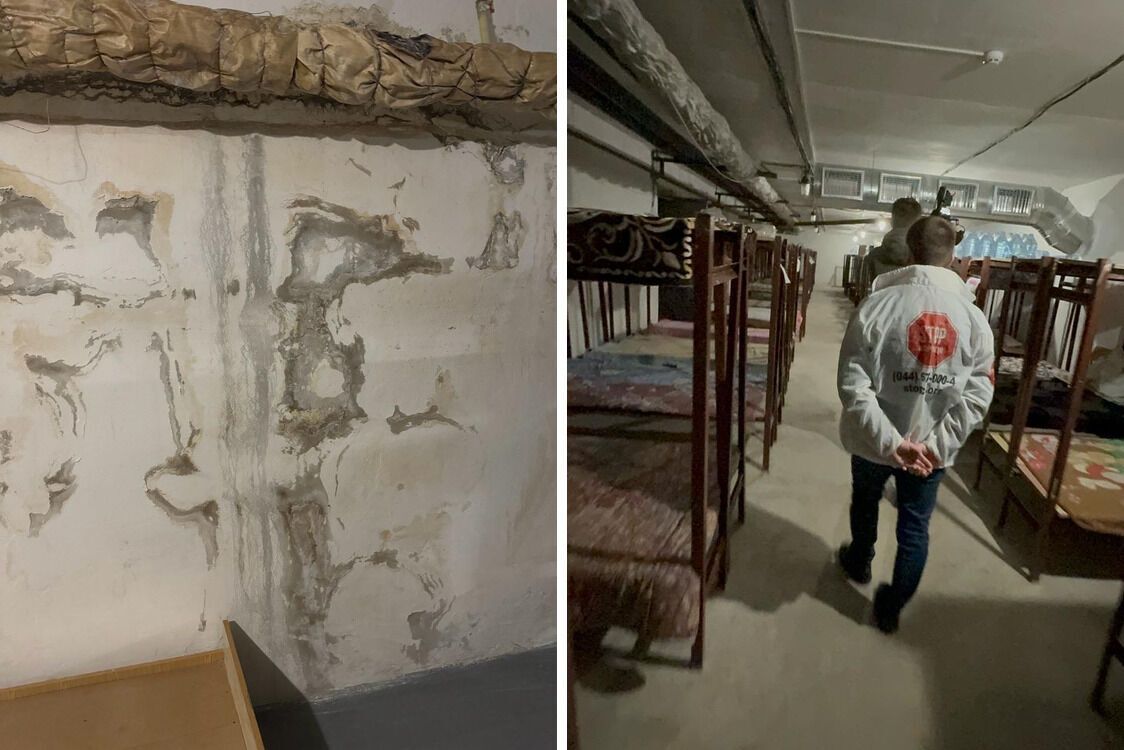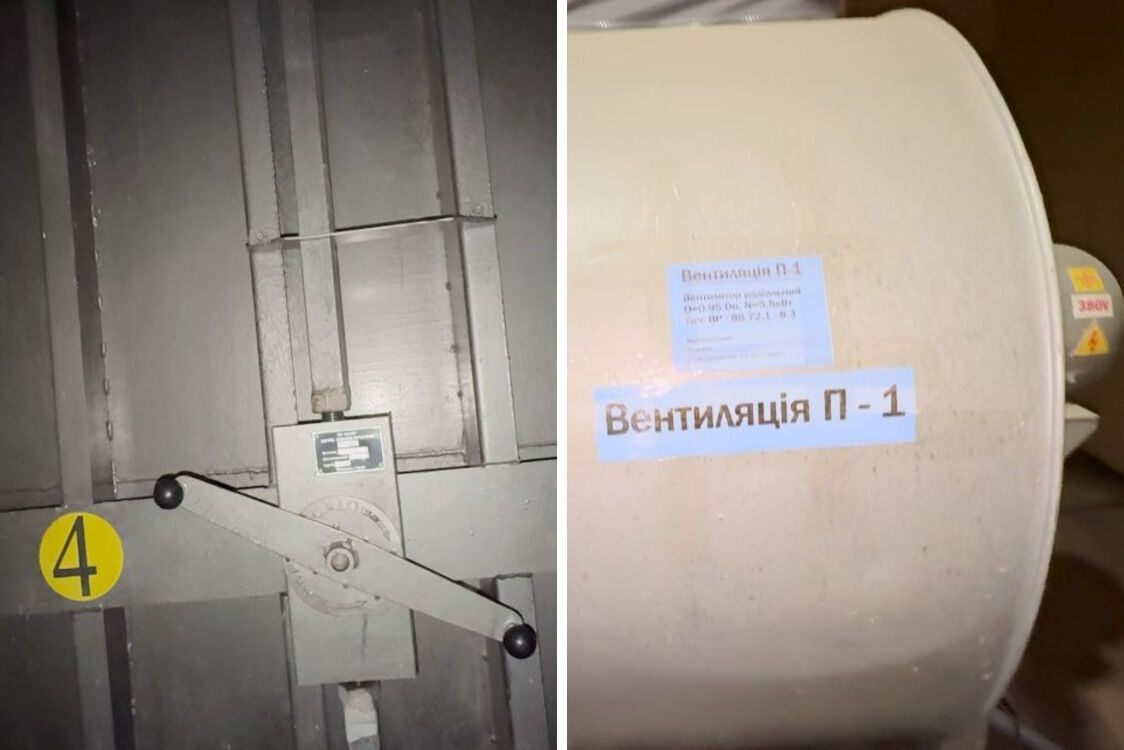«Дети подземелья» по-нетишински: в городе-спутнике АЭС на Хмельнитчине школьники вынуждены прятаться под авиаударов в укрытиях, состояние которых угрожает их здоровью.
Речь идет о грязь, пыли и даже мертвых крыс. Госпродпотребслужба области провела проверку школ и детских садов и констатировала: хранилища – в неположенном состоянии. Правоохранители начали уголовное производство по факту вероятного присвоения бюджетных миллионов, предназначенных на обустройство защитных сооружений.
Кто именно наживается на строительстве укрытий и подвергает детей из Нетешина опасности? Но как все это объясняет городской голова – Александр Супрунюк?
В Нетишине родители школьников бьют тревогу: в соцсетях неоднократно сообщали о грязь, пыли и даже мертвых крыс в хранилищах, где малыши находятся во время воздушных тревог. Как следствие, у детей не только психологические травмы от этого подземелья. Местные врачи фиксируют частые жалобы на головные боли и сильный аллергический кашель.
«Ребенок постоянно приходил в грязи, началась аллергия, водили к врачу. Я узнал, что на укрытие было выделено 5 миллионов из местного бюджета – меня это, честно говоря, сильно возмутило. Здесь не видно этих миллионов по тем условиям, в которых находятся дети. «Поэтому вопрос, я думаю, очень нужно остро ставить для власти, чтобы они несли ответственность и привели укрытие в надлежащее состояние», – отмечает местный активист Степан Воленко.
Что не так с укрытиями?
Недавно Госпродпотребслужба Хмельницкой области провела проверку нескольких общеобразовательных и дошкольных учреждений. Результаты поразили даже инспекторов, ведь обследованные укрытия оказались непригодными для пребывания представителей такого уязвимого слоя населения, как дети. Вот несколько выводов экспертов:
Канализационные трубы изношены и не герметичны.
- Не произведен ремонт потолка и стен в укрытии с применением дезинфицирующих средств с целью уничтожения плесени и грибка.
- Не приобретены кровати в соответствии с количеством детей.
- Ремонтные работы помещения укрытия не завершены, не установлены и устранены причины подтопления.
«Нахождение детей в данных условиях может стать непосредственной причиной или вспомогательным фактором заболеваний среди детей, и крайне опасно», – говорится в документе.
Как это комментируют в местной военной администрации?
Ведь именно эти укрытия должны обеспечить гражданам безопасность на случай угрозы, в том числе – радиационной. На важности этого вопроса отмечает и начальник Нетишинской городской военной администрации Григорий Олендра.
«У нас на территории расположен стратегический объект. Есть необходимость дополнительно организовывать меры правового режима, защиту гражданского населения и в первую очередь – готовить город к обороне. В надлежащем виде должны быть противорадиационные укрытия. Поскольку у города находится атомная электростанция, то это первоочередная задача» , – говорит он.
А что увидела команда своими глазами в противорадиационном укрытии одной из нетешинских школ?
На стенах и потолках – грибок и плесень, а на поверхностях – пыль, которой дышат дети. В туалетах нет двери. Вместо кроватей – старые, неокрашенные нары. Кое-где валяются разобранные металлические кровати и какой-то хлам. И все это – якобы результат капитального ремонта. Хотя даже чисто визуально, работы здесь еще непочатый край.

«Закончить пол – это стопроцентно, потому что на части хранилища, а это 1150 квадратных метров, частично не сделан текущий ремонт пола. Далее стены. Нужно устранить плесень, грибок и отшелушивание самой штукатурки. Но это – не просто косметический ремонт. замену гидроизоляции, дренажа и сливных систем. Там надо перерабатывать все это. Стены нужно покрасить таким образом, чтобы они мылись», – комментирует директор школы Надежда Конончук.
Кроме этого, следует обустроить отдельные туалеты для девочек и парней, привести в порядок спальные места и т.д.
И ответственно за это – Управление капитального строительства (УКС) городского совета.
«Чтобы не быть голословными, мы проинспектировали еще несколько школьных укрытий. Увиденное шокировало не меньше. Одно из них – казалось бы, новенькое – отремонтировали в прошлом году. Но обратите внимание на качество… Потолок начал протекать почти сразу после выполненных работ, которые курировало то же УКС», – отмечает Ольга Левицкая.
Как рассказывает руководитель заведения Елена Груша, протечка началась в декабре, а дальше в помещении – постоянная сырость.
Кстати, по ее словам, отдельные работы легли на плечи самих сотрудников школы. В частности, директор за свой счет покупала краску, а техработники красили пол. Ведь проект от управления капитального строительства этого почему-то не предусматривал, а вручаться в смету ремонта школа не имеет права, поэтому и доделывали потом по УКСу собственноручно.
«То есть что там заложено, не заложено. Проектанты видят, почему так. Возможно, для меня было главное, чтобы построили. Возможно, там была нехватка средств. Я не знаю, как произошло. То есть это краска, это не такие большие деньги, как по мне», – говорит Елена.
Так что дефицит средств или жажда наживы среди чиновников?
Как стало известно нашей редакции, по факту присвоения бюджетных средств при строительстве данного укрытия правоохранители уже открыли уголовное производство.
В то же время ремонт в дошкольных учреждениях очень отличается в лучшую сторону. Не потому ли, что ремонтировали там еще до возникновения Управления капитального строительства или на средства фондов? Руководители садов объясняют, что и напрямую могут договариваться со строителями, однако требуется правовое сопровождение.
«Я не возражаю, если мы будем напрямую работать с организацией, которая будет выполнять эти работы. С другой стороны, нам нужна будет какая-то и юридическая помощь, потому что мы не специалисты в сфере выполнения строительных работ, мы педагоги, мы выполняем образовательный процесс, обеспечиваем образовательный процесс. Но напрямую можем выполнять такие работы», – говорит директор садика Оксана Григорук.
Поскольку педагоги больше знают о своих постройках, им легче сформировать и проконтролировать процесс ремонта укрытия. Именно поэтому УКС не может выступать единоличным заказчиком работ, настаивают местные депутаты.
«УКС должен быть институцией, которая обеспечивает сопровождение нормативно-технической документации при любых ремонтах, реконструкциях», – комментирует депутат Нетишинского городского совета Александр Степанюк.
Итак, депутаты лично взялись проверять укрытия, которыми занималось УКС.
И в ходе инспекции оказалось, что ремонт некоторых объектов значительно задерживался, а состояние исполнения сочли неудовлетворительным.
«В депутатском запросе я изложила факты, которые мы увидели своими глазами, что в Старонетишинской гимназии «Патриот» протекают стены, запирающие там электричество, что там влажность, плесень, то есть некачественно были сделаны работы», – подчеркивает депутат Екатерина Янович.
А как реагирует мэр города?
С 2014 года Нетешин возглавляет Александр Супрунюк. Когда он работал обычным учителем, а затем основал собственное предприятие и проложил дорожку в политику. Несмотря на небольшую численность горожан, заработная г-на Супрунюка немалая: за год – более миллиона гривен. И вдобавок к этому – разнообразные премии и надбавки. Именно при его поддержке, а затем и за подписью и образовался вышеупомянутый УКС.

Правда, во время полномасштабной войны и в условиях огромной опасности для общества средства на укрытие почти не выделялись.
Чтобы узнать, по каким ценам покупали материалы и насколько эффективно использовали бюджетные средства, редакция направила запрос. Однако УКС не предоставил копию проектной документации, будто именно такой не имеет.
«Прежде, чем задать лично мэру вопроса, интересующих нас и жителей города, мы решили проинспектировать последнее и, наверное, решающее укрытие. Укрытие городского совета. И вот как выглядит оно. В этом подвальчике можете чувствовать себя как дома. Есть и герметичные противорадиационные двери, и современная система вентиляции, и комфортные спальные места. А стерильно – как в операционной. Добро пожаловать в другую реальность», – рассказывает репортер.
Почему укрытия для рядовых горожан так отличаются состоянием, условиями и уровнем комфорта от хранилища для чиновников мэрии?

С этими вопросами журналисты отправились к мэрам в день приема граждан г-ном Супрунюком. Однако пройти к мэру медийщикам сразу не разрешили. А пока они терпеливо ждали, Александр Алексеевич вызвал на стопкоровцев полицию за срыв важного совещания.
Репортеров в конце концов не задержали, потому что никакого срыва и препятствия не было. Вместо этого полисмены даже хотели помочь им попасть к мэру, но тщетно. Супрунюк сослался на занятость.
Позже, зайдя еще раз в городской совет, журналисты встретили мэра. Но увидев видеокамеру, он поспешил на черный выход. Пообщаться с господином Супрунюком удалось наконец у его автомобиля. Но предоставить какие-то содержательные комментарии по укрытиям он отказался, ссылаясь на «кучу работы».
Более конкретную информацию о ненадлежащем состоянии укрытий удалось услышать от секретаря Нетишинского городского совета.
Иван Романюк отметил, что противорадиационные укрытия вроде бы, по замыслу, не предназначались для ежедневного использования.
«Получается, что когда мы построили ПРУ, начинается война. И государство говорит: уважаемые, теперь мы это должны использовать как бомбоубежища. Некоторые элементы, которые были сделаны, не предусмотрены как для бомбоубежища, как для регулярного использования», – пояснил он.
Также Романюк добавил, что следует определиться, куда более целесообразно выделять средства.
«Возможно, мы хотим сделать лучшие условия для детей. Этого никто не исключает, что можно сделать гораздо лучше всегда. Но есть ли в этом целесообразность? Я сторонник идеи 30 миллионов отдать ВСУ, и чтобы они сделали так, чтобы у нас не было воздушных тревог», – заявил чиновник.
Пока остается только надеяться, что после огласки Супрунюк и его команда наконец-то обратят внимание на условия, в которых находятся дети общины. А СтопКор уже готовит следующую серию расследования о «двойной жизни» городского головы.
Напомним, Нетишин является городом-спутником Хмельницкой АЭС – объектом критической инфраструктуры Украины. Поэтому в контексте вражеских атак по украинской энергосистеме проблема обеспечения жителей укрытиями и бомбоубежищами особенно насущна. Однако, как ранее выяснила команда СтопКора, городские власти, похоже, подошли к этому важному вопросу довольно специфически: если укрытие для нетишинских чиновников обустроили по классу «люкс», то состояние хранилищ для рядовых граждан и их детей оставляет желать лучшего.


